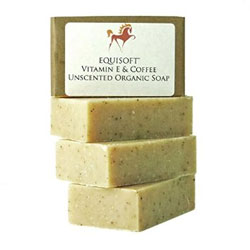Save on All Your Summer Essentials: From Calming Products to Flea & Tick Solutions and More!
Equisoft Organic Soap
SKU : 47305

Price: $7.95
Save 15% on your first Autoship order
+ Save on each recurring order!
+ Save on each recurring order!
Vitamin E skin care Organic Soap
- For Humans, dogs, cats and horses
- Made with the highest quality 100% USA ingredients
- Vitamin E
- Certified Organic Ingredients
- No Synthetic Anything
All profits go to horse rescue efforts
Description
Equisoft Organic Vitamin E and Coffee Soap is handmade - each bar takes eight weeks to make from start to lather.Natural Vitamin E hydrates and brings powerful, hydration factors and anti-oxidant benefits to your complexion, while organic coffee gently scrubs, exfoliates and tightens your skin. No oily residue-just fresh, hydrated clean skin. Each bar of our soap is handcrafted and takes 8 weeks to create.
Ingredients
Oils of Safflower*, Sunflower*, Palm* and Coconut* (with retained glycerin); Natural Vitamin E*, Ground Coffee*, Rosemary Extract* (All Ingredients marked with * are from certified organic sources.)CERTIFIED ORGANIC
VITAMIN E & COFFEE
EXFOLIATING SOAP
This is the Best Non-Greasy unscented organic soap you can buy!
- Super for people, is also great for pets to help clean and
- moisturize those stubborn skin challenge areas.
- Will NOT dry out skin.
- Simple, clean Ingredients.
Oils of Safflower*, Sunflower*, Palm* and Coconut* (with retained glycerin);
Natural Medical Grade Vitamin E*, Ground Coffee*, Rosemary Extract*
(All Ingredients marked with * are from certified organic sources.)
What do we mean by "all natural soap"
To us, natural soap means a soap whose ingredients are plant based, and we further
define our product as an herbal soap. We make ours in small batches by hand for
highest quality. And every batch takes EIGHT WEEKS from start to finish!
No Synthetic Anything:
We oppose the body care industry's use of the word "natural" to include synthetic
fragrances, colorants, and preservatives. We add no artificial substances such as
synthetic fragrances, dyes, and preservatives to our soaps. Where possible, we use
organically grown products.
Our purely herbal soap is…
• Scented with essential oils only .
EQUISOFT
• Colored with organic herbs and plant extracts only.
• Our base recipe is made from 100% certified organic oils.
• Our products contain no parabens or Pegs.
Read through our ingredient list to see what we mean by "natural soap." Then, to really
see what we mean, take a copy of our ingredients with you next time you go to the
store and compare them to the ingredients of soaps on the shelves. Your skin will know
the difference.
How organic is Equisoft soap?
We make every bar with a minimum of 85% organic ingredients…but…
Due to the chemistry of soap, it is almost impossible to go much higher than that.
Within the natural products industry, there is a conversation taking place about whether
soap can be technically defined as "organic" (since soap is the result of a chemical
reaction and most of the original organic materials have been transformed). For our
part, we commit to making soap using ONLY organic base oils and keeping our soap's
ingredients above 85% organic. A soap's raw ingredients are either organic or they're
not, regardless of the definitions, and Equisoft commits to using certified organic oils.
Does Equisoft soap have organic certification?
Yes. Equisoft Soap has organic certification under the USDA's National Organic
Program. Organic certification is a rigorous professional standard that must be
validated and re-issued annually. Many skin-care companies claim to sell organic
products but are not officially certified. Without certification, they are actually in breach
of national policy, and, technically, they are not allowed to make the organic claim. We
believe that official organic certification assures our customers that our ingredients, and
our procedures truly support our organic status.
What makes a good bar soap?
A good bar soap balances bar hardness (durability), lather quality (both fluffiness and
stability), and moisturizing ability. These varying properties come from the different fatty
acids that make up molecules of the organic vegetable oils we use as the base of our
herbal soap.
Nature loves a Paradox!
Unfortunately, the fatty acids that are moisturizing are not those that contribute much to
lather quality, and the ones that make great lather are drying to our skin!
A perfect bar soap is the result of carefully balancing the fatty acids to maximize the
bar's hardness, lather quality, and moisturizing ability. Still confused? Just try our
herbal soap. Trust us!
Does Equisoft use Olive Oil in their soaps?
No, we do not use olive oil in our base recipe. Instead, we use high-oleic versions of
organic sunflower and organic safflower oil. For soap-making there is no functional
difference. Olive oil produces good quality soap because it contains 80-82% oleic fatty
acid, which contributes moisturizing ability to the lather.
The organic sunflower and organic safflower oils we use contain 81-85% oleic fatty
acid, and their other fatty acids line up similarly to those of olive oil. Because of this
remarkable similarity, we can substitute these two other oils for olive oil without
changing the final soap product. (If you are a soap maker, you should do this too.)
However, although substituting high-oleic sunflower and safflower oil for olive oil does
not change the functionality or quality of the soap bar, there is one other significant
difference.
Olive oil costs much more than the sunflower and safflower oils we source, allowing us
to keep our prices down for you while still providing a high quality soap made from
organic oils. Also, the safflower oil we use is grown specifically for us by a local organic
farmer, keeping our carbon footprint as small as possible on one of our main
ingredients. And sunflowers are VERY drought friendly plants!
Does EQUISOFT organic soap contain glycerin?
Yes. Glycerin is a natural part of the vegetable oils we use to make our herbal Vitamin
E & Coffee soap. Our soap qualifies as "glycerin soap," because glycerin accounts for
9-10% of the final product. However—unlike most commercial soap companies, we
retain all glycerin produced during the soap making process. What does that mean?
Well—since glycerin is a valuable commodity, commercial soap makers remove it for
sale, or they keep trace amounts to mention on their labels. Our soaps differ from clear
"glycerin soaps" because our bars are not transparent. To produce their transparency,
so-called "glycerin soaps" contain a sugar-alcohol compound that can dry your skin.
Yuck!
Ours does not.
How does Equisoft Vitamin E and Coffee Soap get its colors?
Our soap’s colors come from natural plant ingredients. In most cases, herbs provide
the color, though some essential oils also contribute color. Because the herbs we use
may vary from batch to batch based on the season, our soap bars can exhibit slight
variations in color. This is completely normal.
What are essential oils versus fragrance oils?
This is one of the most common misrepresentations among natural products,
especially for natural soap.
Essential oils are pure plant extracts used for scenting or aromatherapy.
Fragrance oils are synthetically made substitutes for essential oils.
Many soaps, even those labeled "natural" still contain fragrance oils. Often, a soap
label will say "contains essential oils." However, such a label can be deceiving -- it is
always important to check if it ALSO contains fragrance oils.
Fragrance oils are problematic because, as synthetic compounds, they dry out your
skin and irritate sensitive skin. Equisoft Vitamin E and Coffee Soap, as a purely herbal
soap, contains only true, plant-extract essential oils. As always, read a product's label.
If the ingredients includes the word "fragrance," "perfume," or "perfume," then it's
synthetic and not-natural, even though its packaging may say it is a natural soap.
I have sensitive skin and can't use soap. Can I use Equisoft Vitamin E and Coffee
organic herbal soap?
Although we cannot guarantee it, chances are, yes. Most skin sensitivities are
aggravated by the synthetic ingredients in lotions, creams, make-up, and soaps.
Without these ingredients, however, there is nothing left to irritate your skin. Many
people who have had trouble with dermatologist recommended soap or "sensitive skin"
soap have found success with Equisoft Vitamin E and Coffee Herbal Soap. This is
because even doctor recommended sensitive skin soaps contain many unnecessary
chemicals that can, and do, irritate your skin. Again, always read the list of ingredients
in your soap.
Although many people with sensitive skin can use scented herbal soap varieties, we
recommend our Equisoft Vitamin E and Coffee Unscented Soap for people with
extreme sensitivities.
Will Equisoft’s herbal soap help with my eczema or psoriasis?
Yes. Although our herbal soap does not heal eczema, it will minimize both the redness
and the itching. Again—remove the synthetic ingredients from soaps and there is
nothing left to bother your skin. (Continued Next Page)
(Cont) After using our soap, you'll be surprised to see just how bad your excema or
psoriasis was before. We have many customers with eczema and/or psoriasis, and
they all write to say the same thing: "Thank you!"
What is superfatting?
Superfatting is a process by which soap makers maintain extra skin-nourishing oils in
their soaps. All high quality soaps have super-fatted recipes. Superfatting soaps does
not make your skin oily. Rather, it allows your skin to maintain natural moisture levels.
Does your soap contain lye?
All soap, including ours, is made using lye (NaOH, "sodium hydroxide"). Even
transparent "glycerin" soap and "melt and pour" soaps are made using lye.
(Transparent glycerin soaps are made from oil and lye, like opaque soaps, except that
a sugar-alcohol compound is added to maintain transparency.) In a properly produced
soap, lye is a raw ingredient, but there is no lye that remains in the final product.
All lye is consumed in the soap making process and presents no danger to you.
Superfatting further assures that all lye is consumed.
Any company that claims their soap is not made with lye is either promoting false
information or doesn't understand the chemistry behind soap.
Do your herbal soaps contain SLS?
No. SLS (sodium laurel sulfate or sodium laureth sulfate) and other surfactants are
often added to soaps to increase lather quality. They are commonly found in soaps,
including many marketed as natural soaps, as well as glycerin soaps, liquid soaps, and
shampoos. As synthetic compounds, SLS and other surfactants dry out your skin and,
for many people, cause irritation. We use neither SLS nor any other surfactants. We
don't believe in cost-cutting short cuts. Instead, we prefer to focus on making a high
quality soap from organic oils that doesn't depend on surfactants for its lather. We
carefully balance the oils in our base recipe to provide the proper fatty acid mix for a
wonderful, rich - and most importantly - completely natural lather.
Fatty acids sound like chemicals; are they natural?
All oils (and fats) have a molecular form called a triglyceride, which means they are
made up of three fatty acids, (just chains of carbon and hydrogen atoms), and a
glycerin-like base. In saponification, the fatty acids participate in a chemical reaction
that results in molecules of soap while leaving the glycerin behind. We make all our
herbal soaps in small batches, by hand, from organic vegetable oils and the natural
fatty acids they contain.
We don’t rush, add accelerants or cut corners, each batch takes 8 weeks to complete!







